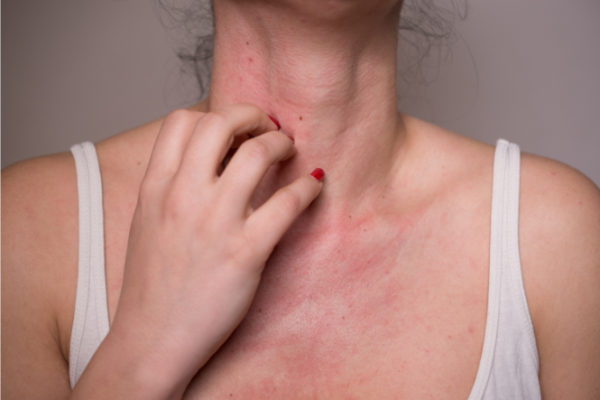Wishing everyone happy holidays and a joyful New Year from the Healthify team. Don't forget to Slip, Slop, Slap and Wrap!
Itching
Also known as pruritus
Key points about itching
- Itching is a feeling on your skin that makes you want to scratch.
- Many things can cause itching. Sometimes it can be hard to work out the exact cause.
- You might feel itchy in one area of your body or over your whole body, depending on what the cause is.
- Treatment usually depends on the cause of your itchiness.
- There are things you can do yourself to help relieve your symptoms.

Itching is a feeling on your skin that makes you want to scratch. Many things can cause itching, but sometimes it can be hard to work out the exact cause. You might feel itchy in one area of your body or over your whole body, depending on what's causing the itchiness. Generalised itching without a rash is most commonly caused by dry skin, especially if you’re over 65 years of age.
Constant scratching to relieve itchiness can damage your skin and make it less effective as a protective barrier against things in your surrounding environment. This can make the itching worse and can lead to other skin issues such as infection.
Treatment of itching usually depends on the cause, and there are self-care measures you can do to help relieve your symptoms.
There are many possible causes of itching. These include:
- dry skin – this is a common cause, especially in older people
- skin conditions such as eczema, allergic reaction, psoriasis, hives, scabies, pubic lice or head lice, or fungal skin infections – you usually have a skin rash with the itching if you have one of these conditions
- other health conditions such as iron deficiency anaemia, liver disease, chronic kidney disease, HIV infection, nerve disorders, or thyroid disorders
- hormonal changes such as pregnancy or menopause
- the side effect of some medicines, eg, opioids, lamotrigine or some antibiotics
- psychological conditions such as anxiety or depression.
Sometimes the exact cause of itching can't be found.

Image credit: Canva
The feeling of itchiness can be unpleasant and uncomfortable. You may feel itchy in one area of your body or over your whole body, depending on the cause.
In severe cases, itching can cause sleep disturbance, anxiety and depression.
See your healthcare provider if you have itchy skin and:
- it’s affecting your daily life
- it doesn’t get better with self-care (see below) or it keeps coming back
- you notice a new rash, lump or swelling that worries you
- it’s really bad or over your whole body
- you’re pregnant – itchy skin in pregnancy is usually nothing to worry about but sometimes it can be caused by a liver condition called obstetric cholestasis or intrahepatic cholestasis of pregnancy.
Your healthcare provider will ask you questions about your itching, including whether you have any other symptoms or allergies, and if you’re taking any medicines that might cause itching. They’ll also examine you and check your skin to see if you have a rash.
You may need some tests, depending on what your healthcare provider thinks is causing your itching. These include:
- blood tests such as full blood count, kidney function tests or liver function tests
- imaging tests such as a chest X-ray or abdominal ultrasound
- a skin swab or biopsy.
Treatment depends on the cause of your itchiness. If there’s an underlying cause this will need to be treated.
You can see a pharmacist about itchy skin. They can recommend over-the-counter medicines such as antihistamines for hives or allergies, moisturisers or menthol-based cooling creams or lotions. They can also advise if you need to see your healthcare provider.
Your healthcare provider may prescribe some medicines or treatment to relieve your itchiness. These include:
- moisturisers or emollients to keep your skin moist
- steroid creams or ointments, or oral steroids
- antihistamines – some antihistamines have sedative effects which can help if itching affects your sleep
- amitriptyline – this can help if you have nerve-related itching or if itching is disturbing your sleep
- gabapentin or pregabalin for nerve- or kidney-related itching or unexplained itching
- rifampicin for liver-related itching
- phototherapy, eg, for kidney-related itching or unexplained itching
- cognitive behavioural therapy to break the itch-scratch cycle.
You may be referred to a dermatologist (a specialist skin doctor) if your symptoms aren’t relieved by these medicines or if you have complications. You can also find a private dermatologist yourself. Find a dermatologist.
Here are some self-care measures you can do to help relieve your itching.
- If you have dry skin, use moisturisers or emollients often. You can keep these in the fridge for an extra cooling treatment.
- Avoid using skin irritants such as soaps, bubble bath or foaming body washes. Your healthcare provider can prescribe soap substitutes, such as cetomacrogol cream with glycerol, to clean your skin or you can buy them from your pharmacy.
- Keep yourself cool, especially at night. Heat will make your itch worse.
- Make sure the water isn’t too hot in your shower or bath. Bathe quickly in cool or tepid water not more than once a day.
- Scratching makes itching worse. Try not to scratch your skin when you feel itchy and avoid situations that make you want to scratch. If you feel you have to scratch, try gentle rubbing of the area instead.
- Keep your nails clean and short to reduce the skin damage caused by scratching.
- Wear light cotton clothing.
- Wear cotton gloves at night to reduce scratching in your sleep.
- Limit your alcohol and caffeine intake as these can make itching worse.
Apps reviewed by Healthify
You may find it useful to look at some skin care apps and anxiety management apps.
Itchy skin isn’t usually a sign of anything serious and it often goes away with self- treatment.
However, ongoing severe itching can be difficult to manage. This may need treatment with a combination of medicines and approaches over a long period. Any underlying health condition causing the itching will also need to be treated.
The following links provide further information about itching. Be aware that websites from other countries may have information that differs from NZ recommendations.
Itching(external link) Patient Info, UK
Pruritus(external link) British Association of Dermatologists, UK
Apps
Skin care apps
Anxiety management apps
References
- Pruritus(external link) Auckland Regional Health Pathways, NZ, 2025
- Pruritus(external link) DermNet, NZ, 2016
- Itchy skin(external link) NHS, UK, 2023
Pruritus(external link) DermNet NZ
Itching(external link) Patient Info Professional, UK, 2022
“Seventh age itch” – preventing and managing dry skin in older people(external link) BPAC, NZ, 2014
Credits: Healthify editorial team. Healthify is brought to you by Health Navigator Charitable Trust.
Reviewed by: Dr Sara Jayne Pietersen, FRNZCGP, Auckland
Last reviewed:





